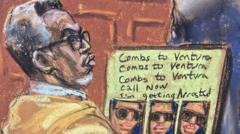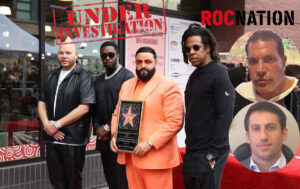While the prosecution has presented a range of compelling testimonies, including those from Diddy's ex-girlfriend Cassie Ventura, legal experts highlight potential vulnerabilities in their arguments. Awaiting the defense's response, the trial raises questions about the nuances of the case and its implications for justice.
Navigating the Complexities of the Diddy Trial: Key Insights from the Prosecution's Case

Navigating the Complexities of the Diddy Trial: Key Insights from the Prosecution's Case
As Sean "Diddy" Combs' federal trial continues in New York, the prosecution has laid out a significant case against the music mogul, accused of sex trafficking and racketeering.
Prosecutors in New York are concluding their case against Sean "Diddy" Combs in a high-profile federal trial focused on serious allegations of sex trafficking and racketeering. The 55-year-old music entrepreneur faces accusations of leveraging his power to exploit women while attempting to obscure his illegal activities. Although Combs has admitted to domestic violence, he maintains a not guilty plea to the prosecution's claims, which employ statutes originally designed to confront organized crime.
The prosecution has already summoned over 30 witnesses, revealing a narrative that underscores Mr. Combs's alleged abusive conduct. Among the key figures is Cassie Ventura, the musician and model who shared her harrowing experience of an 11-year relationship with the rapper marked by violence and coercion into sexual acts. Her emotionally charged testimony was amplified by disturbing evidence, such as hotel surveillance footage capturing instances of abuse and a security guard's account of Mr. Combs's attempts to conceal the crimes.
The trial has also seen the inclusion of another witness, referred to as “Jane,” who offered similar allegations of forced participation in sexual encounters, known as "hotel nights." Jurors have also been shown affectionate messages exchanged between the women and Mr. Combs, potentially complicating the narrative of coercion, according to legal experts.
While the testimony provided a robust framework for the prosecution's claims, some speculate about the impact of losing an anticipated third witness, which could weaken the case by detracting from the multiplicity of corroborative testimonies that juries often favor. The prosecution's focus also included establishing that Mr. Combs orchestrated a "criminal enterprise," allegedly enlisting associates to facilitate abusive situations and conceal his actions.
The complexities of the Racketeer Influenced and Corrupt Organizations Act (RICO) charge present additional challenges, as the technicalities may confuse jurors who must grasp intricate legal concepts and apply them to the factual circumstances. Despite this, the prosecution's narrative has resonated with potential biases: if jurors perceive Mr. Combs negatively, they may lean towards conviction regardless of how well they understand the intricate legalities involved.
As the defense prepares to make its case, Mr. Combs's legal team has opted against calling him to the stand, which is a strategic move designed to protect him from the risks associated with cross-examination. With legal experts noting that the prosecution has successfully established a substantial factual foundation, the defense is expected to pivot towards challenging the overarching charges rather than discrediting individual witness accounts.
Ultimately, the trial continues to hold significant implications for discussions on domestic violence and justice, with observers keen on how the jury will interpret the interplay of testimonies, legal definitions, and the broader societal narratives surrounding the case.




















